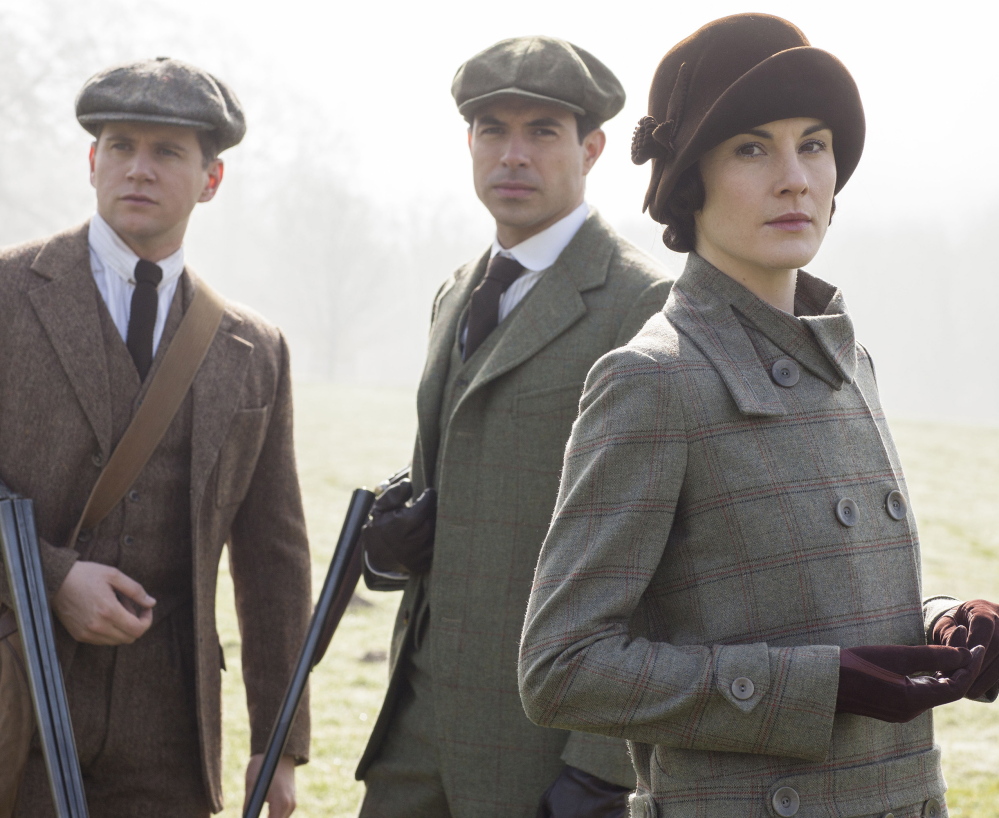The fourth season ended in London, where the Levinsons – Martha (Shirley MacLaine) and son Harold (Paul Giamatti) – ruefully enjoyed the human spectacle. Also: Lady Edith Crawley (Laura Car michael) asked local farmer Timothy Drewe (Andrew Scarborough) to take in her daughter. Lady Mary Crawley (Michelle Dockery) has two suitors, Viscount Gillingham (Tom Cullen), aka Tony, and Charles Blake (Julian Ovenden). Tom Branson (Allen Leech) has a new friend, one Sarah Bunting (Daisy Lewis). Meanwhile, John Bates (Brendan Coyle) and Anna Bates (Joanne Froggatt) are reunited (she was accused of murdering the valet who raped her).
The fifth season begins with these strands largely left dangling, as the world at Downton braces for a new Labour government that may have little regard for Robert, Earl of Grantham (Hugh Bonneville) or Cora, Countess of Grantham (Elizabeth McGovern). And a mystery is solved – just what exactly does Thomas Barrow (Rob James-Collier) know about Phyllis Baxter (Raquel Cassidy)?
MY SAY: A swirling distraction, now mostly just an annoyance, has enveloped “Downton” for months – will the most successful franchise in PBS history continue beyond a sixth season? The future did appear to dim after showrunner Julian Fellowes made that deal with NBC a couple years ago to create an Americanized “Downton,” called “The Gilded Age.” Fellowes, who writes every syllable of the series, said he couldn’t do both, so goodbye to “Downton,” maybe. (He is committed through the sixth, which goes into production this year.)
Here’s the annoying part of all this: NBC is doing just fine with “The Blacklist” and “Chicago Fire,” and is in no rush to add a period costume drama set in 1870s New York. Fellowes apparently isn’t, either. When asked about the future at last summer’s press tour, his co-showrunner, Gareth Neame, said “Downton” will continue as long as there is an audience.
And with Sunday’s opener as guide, that should be for a very long time. “Downton” has entered the sweetspot phase of its life span, whatever that will ultimately be: A place of creative equipoise, where characters can and will be taken to a place of Fellowes’ choosing, and fans will happily follow. The reason is that from the outset, “Downton” has been powered by a beautifully elegant formula, which is theoretically enriched with each passing season. As the outside world roars by (currently, in fact, the Roaring ’20s), the rarefied calm of “Downton” remains airtight, if hardly airless.
The usual threats – social, political, monetary – change with the times, and periodically breach Downton’s defenses. (Outspoken Miss Bunting and that new government with the anti-monarchist bent are just the latest interlopers.) But when they do breach, Fellowes’ canvas grows bigger, and the characters’ lives more intricate. Fans already have an enormous amount of shared history with these lives. Just think how much more sharing if the earl and countess of Grantham make it through the Great Depression and on to World War II.
What was especially good last season, and remains so in the fifth, is “Downton’s” unmatchable skill at cast additions – those many people who arrive here fully formed, like Giamatti’s world-weary, melancholic Harold Levinson, or the feckless Lord Aysgarth (James Fox), who has a nose for money like a hound for the fox, or jazzman Jack Ross (Gary Carr).
They are back, or are eventually expected to be, along with other newcomers. All of them make “Downton” TV’s pre-eminent people-watching pleasure. What a shame if Fellowes pulls up stakes now. The parade hasn’t even reached midpoint.
Copy the Story LinkSend questions/comments to the editors.



Success. Please wait for the page to reload. If the page does not reload within 5 seconds, please refresh the page.
Enter your email and password to access comments.
Hi, to comment on stories you must . This profile is in addition to your subscription and website login.
Already have a commenting profile? .
Invalid username/password.
Please check your email to confirm and complete your registration.
Only subscribers are eligible to post comments. Please subscribe or login first for digital access. Here’s why.
Use the form below to reset your password. When you've submitted your account email, we will send an email with a reset code.